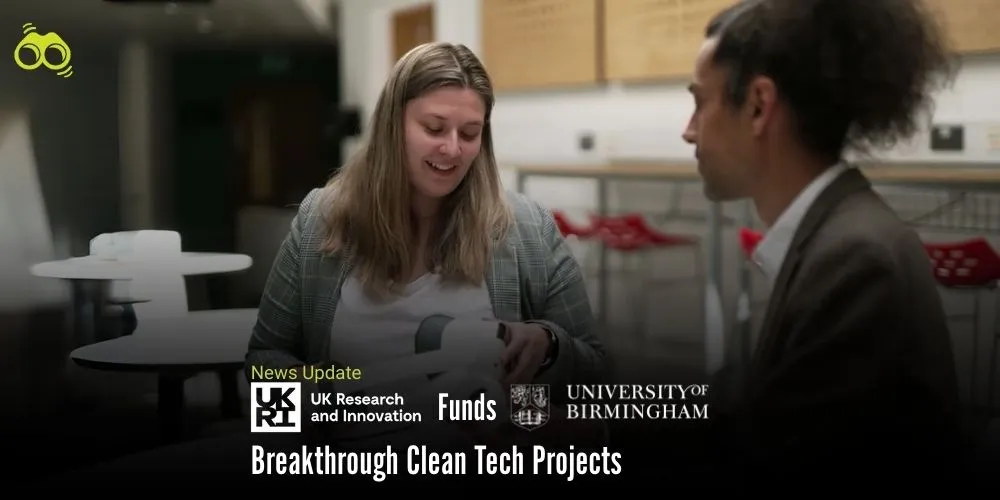EPSRC Invests in Birmingham’s Collaborative Research for Net-Zero and Eco-Friendly Solutions
EPSRC Backs Birmingham’s Research into Fusion Energy and Biodegradable Polymers
Investing in research and innovation remains a cornerstone of the United Kingdom’s strategy to address global challenges and maintain leadership in science and technology. In this context, the UK Research and Innovation (UKRI) Engineering and Physical Sciences Research Council (EPSRC) operates the Prosperity Partnerships scheme, which fosters collaboration between universities and industry to develop practical solutions in critical areas such as clean energy and sustainability.
As part of this national effort, the University of Birmingham has secured funding for two major research projects under the Prosperity Partnerships programme. These initiatives are designed to support the UK’s transition towards clean energy and the adoption of environmentally friendly materials. In doing so, they aim to contribute to environmental protection while strengthening the UK’s global position in scientific and industrial innovation.
The Prosperity Partnerships initiative plays a vital role in enhancing cooperation between leading UK universities and industrial partners. This year, EPSRC has committed £41 million to 23 new partnerships, complemented by an additional £56 million from industry and academic collaborators. Since its inception in 2017, the scheme has supported 100 projects, with a combined investment exceeding £600 million. Professor Charlotte Deane, EPSRC Executive Chair, remarked that the newly funded projects represent a significant investment in the UK’s future, with the potential to drive innovation across sectors including clean energy, pharmaceutical manufacturing, and advanced technologies.
Among the newly funded projects, Professor Arunodaya Bhattacharya at the University of Birmingham is leading a collaboration with Tokamak Energy to develop advanced shielding materials for fusion reactors. These materials are essential for protecting future fusion plants from extreme heat and radiation, thereby ensuring safe and efficient operation. Professor Bhattacharya emphasised fusion energy’s potential as a limitless, carbon-free power source and noted that the project focuses on creating materials capable of withstanding the harsh conditions inside fusion reactors. This initiative is expected to advance the UK’s clean energy objectives by enhancing energy security, generating skilled employment, attracting investment, and reinforcing the country’s leadership in fusion technology.
In parallel, Professor Andrew P. Dove is heading a research partnership aimed at understanding the biodegradation of polymers in liquid formulations (PLFs), which are commonly found in everyday products such as shampoos and cleaning agents. These polymers often cannot be recovered, raising concerns about their environmental impact. The Mission Biodegradability project, led by Professor Dove, includes partners such as Croda, BASF, Lubrizol, Unilever, and others. The team is developing predictive tools and tests to assess how PLFs break down in the environment, intending to accelerate the creation of biodegradable and non-persistent alternatives.
Professor Dove highlighted the widespread use of PLFs in daily life and underscored the need for greater understanding of their environmental effects. He explained that the project will support the development of sustainable alternatives and guide consumers towards more eco-conscious choices. This initiative is expected to contribute meaningfully to the UK’s net-zero ambitions and promote safer, environmentally responsible consumer products. Science Minister Lord Vallance commended these partnerships for addressing a wide range of national challenges, from reducing transport emissions to improving healthcare and praised the collaborative efforts between researchers and industry in delivering tangible societal benefits. The University of Birmingham’s newly funded projects exemplify the power of academic-industry collaboration in driving innovation and advancing the UK’s sustainability and technological goals.
Editor’s Note:
The University of Birmingham’s latest research initiatives, supported through the EPSRC Prosperity Partnerships scheme, highlight the critical role of academic-industry collaboration in addressing some of today’s most pressing global challenges. By focusing on clean energy and sustainable materials, these projects are not only advancing scientific understanding but also creating real-world solutions with long-term impact. Professor Arunodaya Bhattacharya’s work on fusion reactor materials contributes directly to the UK’s clean energy future by supporting the development of safe, efficient fusion power. At the same time, Professor Andrew P. Dove’s Mission Biodegradability project is helping to tackle the environmental footprint of everyday products by promoting the development of biodegradable alternatives.
Skoobuzz believes that together these projects demonstrate how strategic research investment can drive innovation, support environmental goals, and shape a more sustainable and resilient future for the UK and beyond.














0 Comments (Please Login To Continue)